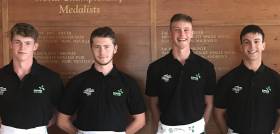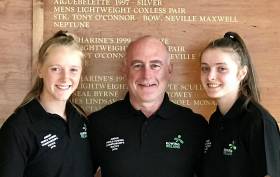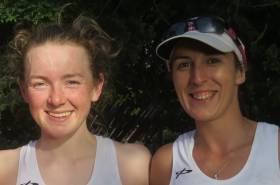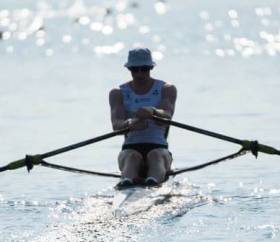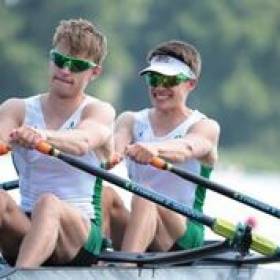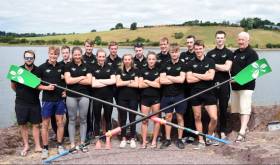Displaying items by tag: Ireland
Ireland Denied as Denmark Set New World Junior Championships Record
#Rowing: Ireland just missed out on a place in the A/B semi-finals of the junior men’s quadruple at the World Junior Championships in Racice, Czech Republic. The crew of Luke Hayes Nally, Alex Byrne, Jack Dorney and Jack Keating finished third to Denmark and Chile, with just two boats going on; the race was fast, setting a new record for this event at a World Junior Championships.
Chile had led through most of the race, with Denmark never far away. Ireland moved into a clear third place. In the final 300 metres Denmark charged into the lead and flew away from Chile. Ireland did their best to catch Chile, but the South Americans kept their nerve well and held on to the crucial second spot by a length.
Ireland go to the C/D Semi-Finals. Earlier the women's junior pair of Eliza O'Reilly and Gill McGirr had qualified for the A/B Semi-Finals.
World Junior Rowing Championships, Racice, Czech Republic (Selected Results)
Men
Quadruple – Repechage Two (First Two to A/B Semi-Finals; rest to C/D Semi-Finals): 1 Denmark 5:52.45, 2 Chile 5:56.25; 3 Ireland (L Hayes Nally, A Byrne, J Dorney, J Keating) 5:58.73.
Women
Pair – Repechage (First Three to A/B Semi-Final; rest to C Final): 1 France 7:25.97, 2 Hungary 7:29.32, 3 Ireland (E O’Reilly, G McGirr) 7:31.49.
New Crew Added to Ireland Team for World Rowing Championships
#Rowing: A lightweight quadruple has been added to the Ireland team for the senior World Championships. Andrew Goff, Ryan Ballantine, Jake McCarthy and Fintan McCarthy will compete alongside the four women’s crews and three men’s crews named earlier this week.
Ireland Team for World Rowing Championships, Plovdiv, Bulgaria, September 9th to 16th:
Men
Pair: M O’Donovan, S O’Driscoll
Lightweight Quadruple: Andrew Goff, Ryan Ballantine, Fintan McCarthy, Jake McCarthy
Double Sculls: Ronan Byrne, Philip Doyle
Lightweight Double Sculls: Gary O’Donovan, Paul O’Donovan
Women
Pair: Aifric Keogh, Emily Hegarty
Double Sculls: Monika Dukarska, Aileen Crowley
Lightweight Double Sculls: Aoife Casey, Denise Walsh
Single Sculls: Sanita Puspure
#Rowing: Ireland’s junior men’s quadruple took fourth in their heat and the junior women’s double fifth at the World Junior Championships at Racice in the Czech Republic.
Two boats qualified for the semi-finals from the heats of the quadruple, and Switzerland, New Zealand and Italy vied for these places in the second half of the race, with Italy missing out. Ireland were next in line.
Greece were convincing winners of their heat of the women’s double, grabbing hold of the one semi-final place on offer. Ciara Moynihan and Ciara Browne held fifth through the race.
Earlier, the Ireland junior men’s coxed four qualified from their heat. The junior women’s pair took fourth and face into a repechage.
The schedule was brought forward and races run at five-minute intervals because of the forecast of very high temperatures in the middle of the day.
World Junior Championships, Racice, Czech Republic (Irish interest)
Men
Four, coxed – Heat One (First Three to A/B Semi-Finals; rest to Repechage): 2 Ireland (C Mulready, J O’Donovan, F Driscoll, E Gaffney; cox: E Finnegan) 6:39.91.
Quadruple – Heat One (First Two to A/B Semi-Finals; rest to Repechage): 3 Ireland (L Hayes Nally, A Byrne, J Dorney, J Keating) 6:13.31.
Women
Pair – Heat Three (First Three to A/B Semi-Finals; rest to Repechage): 4 Ireland (G McGirr, E O’Reilly) 7:54.87
Double – Heat Two (First to A/B Semi-Final; rest to Repechage): 5 Ireland (C Moynihan, C Browne) 7:47.20.
#Rowing: Ireland had a good start to their campaign in the World Junior Championships. The Ireland coxed four of Conor Mulready, James O’Donovan, Fintan O’Driscoll, Eoin Gaffney and cox Eoin Finnegan took a good second place in their heat, comfortably qualifying for their semi-finals as the second of three qualifiers. Canada won and Russia came through in third.
In the women’s junior pair, Gill McGirr and Eliza O’Reilly took fourth in their heat and will face into a repechage. The United States won – by an extraordinary margin – from Canada, while Britain came through in their own battle for third with Ireland.
World Junior Championships, Racice, Czech Republic (Irish interest)
Men
Four, coxed – Heat One (First Three to A/B Semi-Finals; rest to Repechage): 2 Ireland (C Mulready, J O’Donovan, F Driscoll, E Gaffney; cox: E Finnegan) 6:39.91.
Women
Pair – Heat Three (First Three to A/B Semi-Finals; rest to Repechage): 4 Ireland (G McGirr, E O’Reilly) 7:54.87
#Rowing: Denise Walsh and Aoife Casey gave Irish fans plenty to cheer about at the European Rowing Championships in Strathclyde Park in Scotland. The Ireland lightweight double fought it out with Germany in an exciting B Final. Germany’s Leonie Pless and Katrin Thoma led at halfway, but Walsh and Casey pushed into that lead for the remaining 1,000 metres. As they crews came to the line, cheered on by the crowd, Ireland upped the rate. The Germans held out and won by one-third of a length.
European Rowing Championships, Day Four (Irish interest)
Women
Lightweight Double Sculls – B Final (Places 7 to 11): 1 Germany 7:11.14, 2 Ireland (A Casey, D Walsh) 7:11.77, 3 Austria 7:15.63.
O'Driscoll and O'Donovan Race in European Rowing Heat
#Rowing: Ireland’s Shane O’Driscoll and Mark O’Donovan finished fourth in their heat of the pair on the opening day of the European Championships in Strathclyde, Glasgow. Just two crews go through to the A/B semi-finals, and Ireland face into a repechage.
The race was well jugdged by Matthew Rossiter and Oliver Cook of Britain. They held a place behind leaders Belarus and the Netherlands until the final quarter, then elbowed their way into second. The Netherlands cracked and finished third.
O’Driscoll and O’Donovan rowed well, but were not part of the final charge for qualification places and eased off with an eye on the repechage.
European Rowing Championships, Strathclyde, Scotland (Day One, Irish interest)
Men
Pair – Heat Three (First Two to A/B Semi-Finals, rest to Repechage): 1 Belarus 6:37.38, 2 Britain 6:37.76; 4 Ireland (M O’Donovan, S O’Driscoll) 6:48.94.
#Rowing: Ireland took a bronze medal in the junior men’s pair at the Coupe de la Jeunesse at the National Rowing Centre today. The crew of Odhran Donaghy and Nathan Timoney finished behind Belgium and Italy. On Saturday, Ireland had taken a bronze medal in the men’s coxed four final and took a silver medal in the women’s double (Molly Curry and Aoibhinn Keating) and a bronze in the men’s pair (Donaghy and Timoney) on the basis of heat times as finals could not be held because of the high winds. Britain won the overall prize and topped the junior men's rankings. They were second to France in the junior women's table. Ireland were third overall in the men's and women's rankings .
Byrne Takes Fifth in A Final at World Under-23 Championships
#Rowing: Ronan Byrne had to settle for fifth place in the final of the men’s single sculls at the World Under-23 Rowing Championships in Poznan, Poland. The defending champion, Trevor Jones of Canada is just 20 but he managed the race superbly, taking the lead and holding out against challenges from Marc Weber of Germany and Ben Davison of the United States. Behind these, Bulgaria’s Boris Yotov and Byrne fought their own battle through the middle of the race. In the final 200 metres, Davison, in third, caught a crab and left the bronze medal open – but it was the Bulgarian who grabbed it. Davison took fourth ahead of Byrne.
World Under-23 Championships, Poznan, Poland, Day Five (Irish interest):
Men
Lightweight Double Sculls – A Final: 1 Spain 6:16.29, 2 Italy 6:16.66, 3 Germany 6:17.87; 5 Ireland (F McCarthy, J McCarthy) 6:20.42.
Single Sculls – A Final: 1 Canada 6:48.70, 2 Germany 6:50.51, 3 Bulgaria (B Yotov) 6:51.42; 5 Ireland (R Byrne) 6:59.57.
Women
Lightweight Double Sculls – B Final (places 7 to 12): 5 Ireland 7:11.0.
Fifth for McCarthy Brothers at World Under-23 Rowing
#Rowing: Ireland’s Fintan and Jake McCarthy finished fifth in their A Final of the lightweight double sculls at the World Under-23 Championships in Poznan, Poland, today. Spain took over from Germany to lead in the middle stages of the race and they saw off an Italian challenge late in the race. Italy slotted into second, and a race developed between Germany, Chile and Ireland for the bronze medal. Ireland could not crack it, and Germany took third, with Chile fourth.
World Under-23 Championships, Poznan, Poland (Irish interest):
Men
Lightweight Double Sculls – A Final: 1 Spain 6:16.29, 2 Italy 6:16.66, 3 Germany 6:17.87; 5 Ireland (F McCarthy, J McCarthy) 6:20.42.
#Rowing: The McCarthy twins, Jake and Fintan, gave Ireland its fourth A Finalist at the World Under-23 Rowing Championships in Poland today. They finished second in the semi-final of the lightweight double sculls. This was a close race: Spain led early on and eventually won from fast-finishing Ireland, who had won a battle with New Zealand, who took the third qualifying spot, and Portugal, who took fourth.
The early stages looked very promising for the women’s lightweight double of Lydia Heaphy and Margaret Cremen in their semi-final. They led to 700 metres, but then Greece and, with a more consistent challenge, Italy, moved ahead. The early part of the third quarter saw the Ireland crew fight a battle with Australia. The Australians moved into a clear third and from there Ireland slipped back. They finished fifth, behind the Netherlands, who took fourth.
World Under-23 Rowing Championships, Day Four, Poznan, Poland
Men
Lightweight Double Sculls – Semi-Finals (First Three to A Final; rest to B Final) 1 Spain 6:41.66, 2 Ireland (F McCarthy, J McCarthy) 6:42.45, 3 New Zealand 6:44.17.
Single Sculls – Semi-Final (First Three to A Final; rest to B Final): 1 United States (B Davison) 7: 14.65, 2 Ireland (R Byrne) 7:17.88, 3 Germany (M Weber) 7:24.24.
Lightweight Single Sculls – D Final (Places 19 to 24): 2 Ireland (H Sutton) 7:21.95.
Women
Lightweight Double Sculls – Semi-Finals (First Three to A Final; rest to B Final): 1 Italy 7:24.69, 2 Australia 7:30.08, 3 Greece 7:31.23; 5 Ireland (L Heaphy, M Cremen) 7:47.66.


























